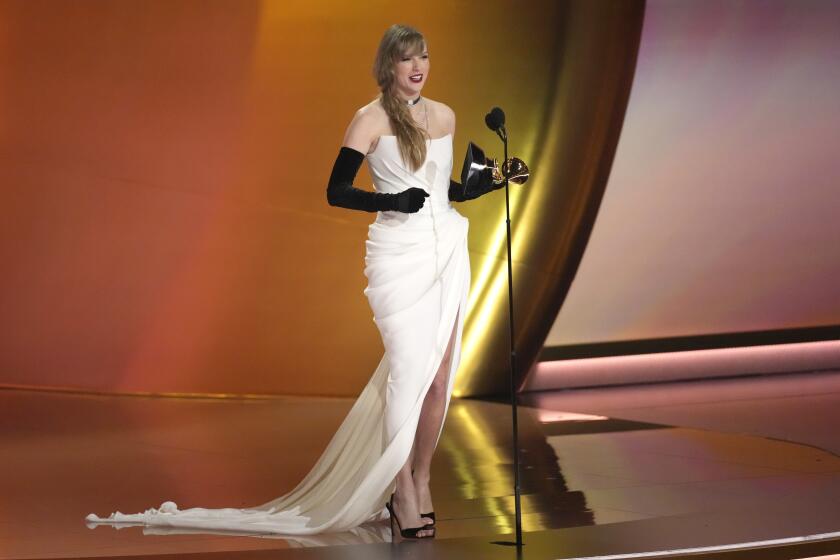Die Antwoord prompts a big question
Since February, the question has become so linked with South African “rave-rap” trio Die Antwoord that you’d be forgiven for thinking the cuss-word-laden query is actually part of the group’s name.
“Die Antwoord? What the … ?!”
The trio’s name translates as “the answer” in Afrikaans. But that emphatic question has been posed all over the “interwebs” (the group’s misnomer for cyberspace) thanks to Die Antwoord’s hauntingly enigmatic homemade videos “Enter the Ninja” which became viral supernovas this year, racking up a combined 11 million YouTube views. Puzzlement with the group also reverberated through the Coachella Valley Music and Arts Festival in April, where the trio confounded and dazzled festival-goers over the course of a riotous 20-minute set.
According to hard-rhyming, helium-voiced frontwoman Yo-Landi Vi$$er, Die Antwoord is growing increasingly comfortable with causing confusion. “It’s alien, all right?” she said. “It’s not really our problem. And not everyone’s confused.”
Chalk up the head-scratching to the Cape Town trio’s singular synthesis of throw-away cultural effluvia: its bawdy sex rhymes and naked celebration of a uniquely South African white trashiness called “Zef,” its employ of imagery equally inspired by children and the criminally insane as well as the sense of cultivated mystery that has shrouded Die Antwoord for the last nine months.
The group is poised to become the biggest international rap cross-over since Falco in the 1980s. But given the bandmates’ well-documented pre-Die Antwoord past — as members of the jokey “corporate” rap group MaxNormal.TV and the experimental music collective the Constructus Corporation — what its core constituency of hipsters and bloggers really want to know: Is Die Antwoord punking the world à la Ali G? Or worse, is it conceptual art?
Seated at a Mid-City hotel restaurant, the greyhound-thin, heavily tattooed lead rapper, Ninja (Watkin “Waddy” Tudor Jones), scoffed with undisguised scorn: “Yes, it’s a joke. We laugh ourselves to sleep every night.”
Frowning, his face a grave rictus of sober intent, he added: “Conceptual art, I don’t even know what that is.”
For now, neither fans, art lovers nor the machers controlling record label purse strings seem to care. On the strength of Die Antwoord’s viral popularity, the group triggered a bidding war among five major labels and signed a five-album deal with Cherrytree/Interscope Records in May. On Oct. 12, after nearly a year of Die Antwoord’s incessant touring, performing at packed shows and festivals across North America, Europe and Japan, its debut album, “$O$” finally reached retail, landing at No. 109 on the national album chart and cracking the United Kingdom top 10 with the single “Evil Boy.”
And recent weeks have seen the group’s video output both lionized and censored. The two-minute “Zef Side” clip, directed by photographer-commercial director Sean Metelerkamp, was selected to be shown at New York’s Guggenheim Museum last week as part of a global video art competition titled “YouTube Play.” Meanwhile, Die Antwoord’s controversial video for “Evil Boy” — which features talking breasts, an explicit rap verse about male circumcision and an overabundance of penile imagery — was pulled from YouTube this month.
The group’s next, seemingly inevitable step: movie stardom. “Hollywood’s not knocking on our door,” said Ninja. “They’re banging down the door with a sledgehammer.”
To wit: Vi$$er and Ninja have downed cappuccinos at David Lynch’s Hollywood home, discussed film projects with “District 9” helmer (and fellow South African) Neill Blomkamp and plan to shoot a short film with “Gummo” writer-director Harmony Korine next month in Nashville. (The group’s mysterious 19-year-old DJ Hi-Tek, who is responsible for creating the group’s synth- and bass-heavy musical undergirdle, seldom travels and never does interviews.) Director David Fincher ( “The Social Network”) tried to enlist Vi$$er to portray one of Hollywood’s most hotly contested female characters of the past decade, Lisbeth Salander, in his reboot of “The Girl With the Dragon Tattoo” franchise, despite Vi$$er’s near-total absence of acting background. The diminutive rapstress passed.
“They said they wanted me to be in it. Or they wanted to base the character on me,” Vi$$er said. “That was never something I really wanted to do — at least in that movie.”
But with the help of their high-powered agents at William Morris Endeavor, Die Antwoord could release its own movie — a feature film detailing the band’s creation called “The Answer” — as soon as next year. After some shushing and some harried conversation in Afrikaans between Vi$$er and Ninja (who reluctantly admit they have a 3-year-old daughter together but are not a couple), Ninja decided to divulge plot points.
“Have you seen ‘Buffalo 66’? It’s not going to be exactly like that, but the pace is,” Ninja explained. “One scene takes place at the end of a rave. There’s this acid dealer, the Elf, who thinks he’s from ‘Lord of the Rings.’ He tries to warn Yo-Landi how powerful this acid is, and Yo-Landi tries to show off by taking a lot.”
Reached a day after the “Zef Side” Guggenheim event, Metelerkamp recalled the group members’ meager expectations for the no-budget interview/performance clip aimed at explaining Zef — tacky, Afrikaner brand ostentation that can be seen as a kind of triumphal, new millennial ghettofabulousness — to the world. He went on to present his take on Die Antwoord’s process of self-mythologizing to clear up the “is this a joke or not?” debate.
“I don’t think it’s a joke,” Meterlerkamp said. “It is fair to call it an art project. Waddy, he’s a nice guy. Very different than the character, very sure of what he wants. When I met him, he had Ninja in his head. But he needed someone to bring Ninja to life visually.”
The director continued: “Ninja and Yo-Landi are very serious about what they are doing. It’s real in their own minds.”
For its part, Die Antwoord dismisses Meterlerkamp’s contributions. “We don’t even like the guy that did that video!” Ninja exclaimed. “We didn’t even mean for that to be on the Internet,” added Vi$$er.
Their plan is to release no more than five albums before disbanding. It prompts the question, what if there’s still demand for Die Antwoord? Ninja paused before replying in typically magniloquent, Antwoordian fashion: “When Michael Jordan retired, he was a god. But he came back as a man.”
More to Read
The biggest entertainment stories
Get our big stories about Hollywood, film, television, music, arts, culture and more right in your inbox as soon as they publish.
You may occasionally receive promotional content from the Los Angeles Times.







